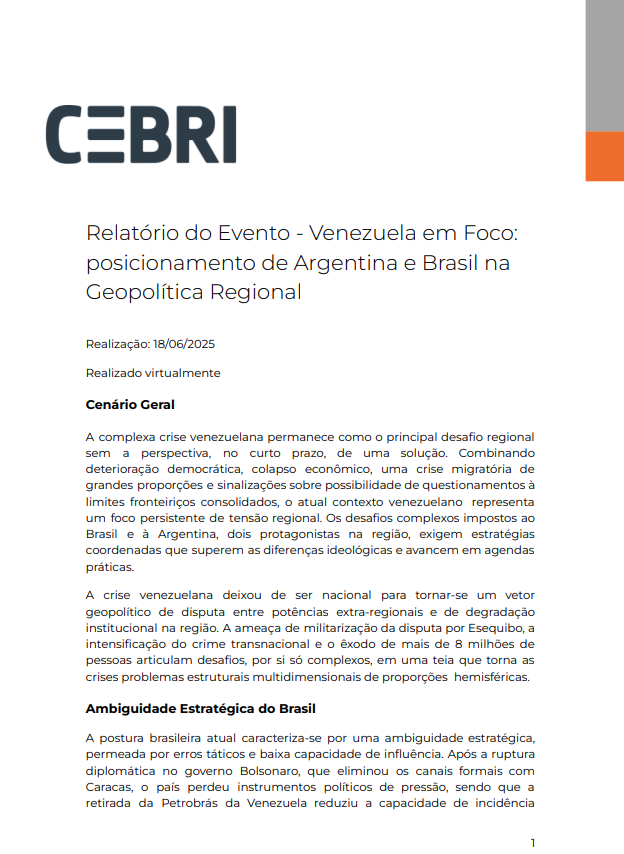Online events
Venezuela in Focus: Argentinian and Brazilian position in regional Geopolitics
The prolonged crisis in Venezuela has been a central point on the regional agenda, generating contrasting diplomatic responses from neighboring countries. Argentina and Brazil, as South American powers, have adopted positions that reflect both their internal political dynamics and their views on democracy, human rights and sovereignty. Differences in their approaches, from open condemnation to calls for dialogue, have influenced regional efforts to address the Venezuelan situation and its collateral effects.
This event will offer an in-depth analysis of the positions of Argentina and Brazil vis-à-vis the crisis in Venezuela, assessing how their political orientations, governmental transitions and diplomatic strategies have determined their responses. It will also examine the implications of these positions in regional integration frameworks, such as Mercosur and CELAC, and their impact on the democratic stability of the continent. In addition, the impact of the Trump administration's policies on the situation in Venezuela and how these policies have affected domestic and regional dynamics will be addressed. Through presentations and debates, the meeting will analyze the role that both countries can play in promoting diplomatic and sustainable solutions for Venezuela, and to what extent their differences hinder or enrich regional collective action. The event will bring together specialists in diplomacy, regional politics and governance to discuss the challenges and opportunities presented by the relationship between Argentina, Brazil and the Venezuelan crisis.
Partnership: Consejo Argentino para las Relaciones Internacionales (CARI)
The prolonged crisis in Venezuela has been a central point on the regional agenda, generating contrasting diplomatic responses from neighboring countries. Argentina and Brazil, as South American powers, have adopted positions that reflect both their internal political dynamics and their views on democracy, human rights and sovereignty. Differences in their approaches, from open condemnation to calls for dialogue, have influenced regional efforts to address the Venezuelan situation and its collateral effects.
This event will offer an in-depth analysis of the positions of Argentina and Brazil vis-à-vis the crisis in Venezuela, assessing how their political orientations, governmental transitions and diplomatic strategies have determined their responses. It will also examine the implications of these positions in regional integration frameworks, such as Mercosur and CELAC, and their impact on the democratic stability of the continent. In addition, the impact of the Trump administration's policies on the situation in Venezuela and how these policies have affected domestic and regional dynamics will be addressed. Through presentations and debates, the meeting will analyze the role that both countries can play in promoting diplomatic and sustainable solutions for Venezuela, and to what extent their differences hinder or enrich regional collective action. The event will bring together specialists in diplomacy, regional politics and governance to discuss the challenges and opportunities presented by the relationship between Argentina, Brazil and the Venezuelan crisis.
Partnership: Consejo Argentino para las Relaciones Internacionales (CARI)



.png)




